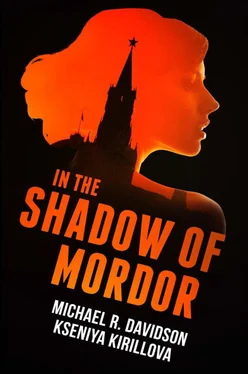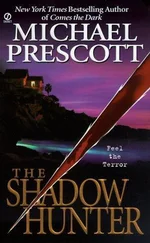“What now?” she asked, keeping her voice neutral.
This was better — a proper question. “As a Chekist you will learn that the ability to recognize an opportunity and take advantage of it is your greatest weapon. Now we’ll take advantage of this situation and stir the pot with a little desinformatsia , misinformation.”
“How?”
“We send a message to the media laying responsibility for the bombing on the vahabiti , [12] Wahabis — the term used in Chechnya and Dagestan to refer to Islamist terrorists.
the damned Muslims. That will scare the shit out of the Americans. As a matter of fact, my young friend, that’s your next job.”
“Me? Why me?”
“You speak perfect American English,” he said. “We’ll keep the Americans off balance. It’s all good.”
Karpov stood a bit unsteadily on vodka loosened limbs, extracted a plastic baggie from his pocket and dropped it in front of her. Inside were a half-dozen envelopes addressed to various major media outlets.
“Find a mailbox somewhere and drop these in. Be sure you don’t touch the envelopes unless you’re wearing gloves. We wouldn’t want any of your DNA or your fingerprints on them. Do this tomorrow morning.”
He handed a piece of notepaper to her. “These are the phone numbers of four local television stations and a short statement. Make the calls from one of the burner phones you have, and then toss the phone. Make sure there are no surveillance cameras near-by. Then go back to your work at the Russian-American Study Group and carry on as usual.”
She stared at the plastic baggie. Karpov’s instructions were simple and straightforward. The only thing she had to worry about was avoiding surveillance cameras when mailing the envelopes and making the phone calls. She could accomplish everything within the space of fifteen minutes. But could she “carry on as usual?”
Karpov stood scrutinizing her, swaying slightly. “Is everything clear?”
“Yes. Of course.”
“Good,” said Karpov. “Now, go.”
She left the Embassy on rubbery legs. Karpov had tricked her into participating in a mass murder. She had been part of an indiscriminate massacre, even if unwittingly. Was this what it meant to a Chekist?
When she was gone Karpov returned to his office and threw himself wearily in his chair. He was still for several minutes staring at nothing then shook his head and regarded the nearly empty bottle of vodka. The thought came to him that he was very like the bottle — mostly empty with only the dregs remaining. He missed the old days when the KGB had been a serious organization. When he had been the girl’s age there had been important work to be done. Now, he found himself little more than an appendage of a machine that he both feared and served. It was all such a squalid business.
Karpov would never be as unimaginably wealthy as some of his former colleagues, but was a survivor and would continue to survive by unquestioningly following orders. Did his superiors in Lubyanka even realize that the subway bombing was an act of war? If the Americans discovered the truth, would the missiles fly and bring all the madness to an end?
But the bombing had had another goal besides just killing Shtayn. The geniuses in Moscow thought that Islamist terrorist attacks on the West coincided with Russian interests. Soon the Europeans and Americans would decide that they needed Russia on their side in the war against terror more than they needed to worry about places like Ukraine. Put enough pressure on them, so the thinking went, and sanctions would be dropped, and the Russians would be viewed as saviors. And the Americans would never connect Russia to the bombing, would they?
He very carefully refilled his glass and drained it.
The bottle was now completely empty.
Krystal Murphy and Special Agent Ferguson grabbed a table by the window at a Starbucks on Courthouse Plaza, not far from her office. This followed an uncomfortable impromptu press conference at the crime scene. Without his parka and watch cap, the FBI agent was solidly built with a shock of unruly jet-black hair that matched the dark shadow of a beard on his jaw.
She didn’t get on well with the press, but Chief Fogerty introduced her to the gaggle of reporters as his primary investigator and the go-to person for questions. She’d had no choice but to politely say to the microphones that it was too early to speculate on what might have caused the explosion and that the Arlington police were working hand in hand with the FBI and Homeland Security.
After the scene inside the Metro Station, neither she nor Ferguson harbored any doubt about what they faced. This was no gas main explosion, no electrical malfunction; this was a terrorist suicide bombing, and it scared the hell out of her.
Random acts of terrorism by self-motivated extremists were at the top of the law enforcement’s threat list. Without forewarning about a specific individual who might be contemplating such violence, it was impossible to predict where and when an incident might take place. Heretofore, terrorism on American soil had been perpetrated almost exclusively by men. But now this unknown, apparently lone woman had blown herself and dozens of others to bits and increased the suspect pool by a hundred percent.
Ferguson stared glumly into his coffee, his thoughts as dark as the brew. “We need a starting point,” he said.
“Agree. There won’t be much, if anything, to go on until we have the forensics results, unless we get a break. What does your gut tell you?”
“My gut tells me there’s going to be hell to pay. We might not be able to confirm to the press what we suspect, or even what we may find, but the speculation is already out there, and before you know it we, the FBI, Homeland, even you cops, will be blamed for ‘missing the clues.’ Then the politicians on one side will demand scalps, and the ones on the other side will say it was only the action of a single deranged person and has nothing to do with religion. Meanwhile, people are dead and maimed, and we could be in store for more.”
“Maybe someone will claim responsibility for the bombing,” she said.
“Yeah, and maybe there’ll be fifty claims from nutcases all over the place, and we’ll have to track down every one. Like you said, Murphy, if we don’t get a break, a big juicy break, a lead we can’t see right now, we might never solve this case. Or if today’s bomber has friends, they could all blow themselves up before we find them.”
“Jeez, Ferguson, you’re just a bundle of optimism, aren’t you?”
He gave her a rueful grin. “Sorry. What we just saw isn’t exactly a confidence builder.”
“No need for apologies. But you feebies have the lead on this.”
He sighed. “Yeah, I know. We’ll start by checking the alerts and potential bad guys we have on file. Maybe something will pop from the travel lists. Leads aren’t quite so easy to come by since they clipped the NSA’s wings. Assholes!”
“The NSA?”
“No, the politicians and the gullible idiots who believe the hype, the absolute falsehoods they’ve been fed about metadata.”
“Copy that. The way I see it, you guys and the intel types are damned if you do and damned if you don’t. That’s why I like being a simple cop.”
Ferguson regarded her with what might have been envy. He gulped the dregs of his coffee and said, “I’d best get downtown. It’s going to be a long night. Can I drop you anywhere?”
She didn’t want to go to the office where she would face a barrage of questions to which she as yet had no answers. So she hid out at home in the hope that more information would be available tomorrow. She hadn’t been in the apartment long enough even to unpack before Fogerty’s phone call. Frankly, she just wanted to close her eyes and wish it would all go away.
Читать дальше












